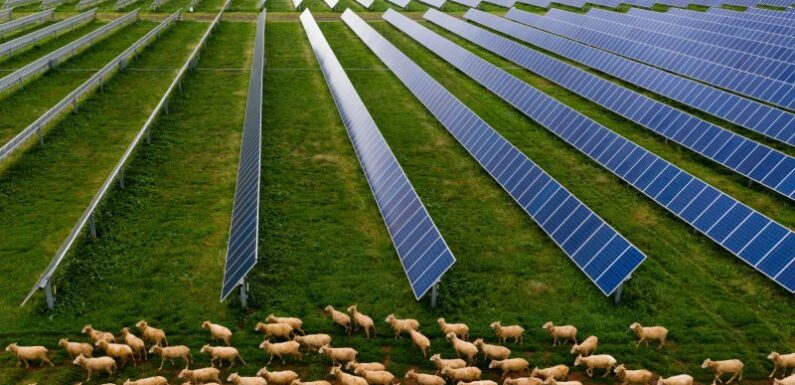
Save articles for later
Add articles to your saved list and come back to them any time.
Prime Minister Anthony Albanese is facing a farmer revolt over plans for vast networks of power lines needed to shift the electricity grid from coal-fired to renewable energy.
Albanese visited Tamworth on Friday where he heard farmers’ concerns about the planned rollout of thousands of kilometres of high-voltage transmission lines linking solar and wind farms to the grid, which threatens to erupt into a major political stoush.
There is growing farmer opposition to thousands of kilometres of power lines, which are being built to connect a network of rural wind and solar farms to cities. Credit: Janie Barrett
The National Farmers’ Federation has vowed to oppose any widespread compulsory acquisition of farmland needed for power line corridors “to the bitter end”.
But energy experts say compulsory land purchases may be needed to speed up the rollout, which is running behind schedule, potentially jeopardising both Australia’s ability to compensate for looming closures of coal-fired power plants and the government’s climate targets.
The government has committed to lower Australia’s emissions by 43 per cent by 2030, in large part by more than doubling the amount of power the grid sources from renewables to 82 per cent by the end of the decade.
National Farmers’ Federation chief executive Tony Mahar called on the Albanese government to hold companies to account, warning farmers would not agree to the compulsory acquisition of their land.
“This idea of widespread mandatory acquisition of farmland, which disrupts agricultural production and the communities in which they are located, will be opposed by the agriculture sector to the bitter end,” Mahar said.
“You can’t simply plough ahead with policy around renewable energy, treat farmers with contempt and blatantly ignore the impacts that it’s going to have on agriculture, rural and regional communities and businesses.”
Albanese said he had a respectful and constructive discussion on Friday with farmers who wanted to ensure there was proper consultation before transmission routes were finalised.
“Clearly the energy companies need to do better when it comes to that engagement and consultation,” Albanese said.
“We do need to respond to climate change, but we also need to take up the opportunity that’s there for a growth in jobs that will come from renewable energy – that renewable energy is the cheapest form of new energy.”
Power line delays are being driven in part by local objections to the effect key projects such as HumeLink in NSW and the Western Renewables Link and VNI West in Victoria will have on property values, the environment and the landscape.
Grattan Institute energy program director Tony Wood said these projects were “all way behind where they need to be” and the government might need to spend money to both speed them along and buy the land corridors required.
“To get anywhere near the 82 per cent renewables, which is also directly connected to the 43 per cent emissions reduction target, is looking quite hard,” Wood said.
“The only way you’re going to do that is to really put your foot down, which means you may end up building some stuff that is more expensive than you had hoped, and you may end up having to do compulsory acquisition.”
Australia is experiencing one of the world’s fastest energy transitions as the profitability of coal-fired power stations, which still make up two-thirds of the electricity grid, is hammered by cheaper sources of renewable energy.
AGL’s Liddell coal plant in NSW closed earlier this year and at least four more – the Yallourn generator in Victoria’s Latrobe Valley, NSW’s Eraring and Vales Point power plants, and Queensland’s Callide B – are expected to shut down by 2030.
This means massive volumes of coal-fired power must be replaced by the end of the decade, which requires thousands of kilometres of new transmission lines to be urgently built to plug in giant new wind and solar farms, and better facilitate the flow of clean energy from one part of Australia to another.
However, the transmission links joining the eastern states’ power grids are already “maxing out”, the Australian Energy Market Operator has warned, while massive volumes of solar and wind power are having to be curtailed because there was not enough transmission capacity to transport it.
Climate Change and Energy Minister Chris Bowen announced on Thursday “overdue improvements” to consultation with local communities that he said would ensure they reaped the benefits of new jobs and investment in renewable projects.
The draft rule changes, to be implemented by the Australian Energy Market Commission, say communities must be able to consider and respond to project proposals, companies must take their feedback into account, and consultation must start early in the planning process and continue frequently throughout development.
New England Nationals MP Barnaby Joyce spearheaded a farmer protest in his electorate on Friday, which was timed to coincide with Albanese’s visit to Tamworth, accusing the government of overseeing “tick-a-box” consultation while the threat of compulsory land acquisition hung over farmers.
“The government, who has the power to compulsorily acquire and drive their agenda through your land – to change the landscape around your house – are doing precisely that,” Joyce told the ABC.
Cut through the noise of federal politics with news, views and expert analysis. Subscribers can sign up to our weekly Inside Politics newsletter here.
Most Viewed in Politics
From our partners
Source: Read Full Article
